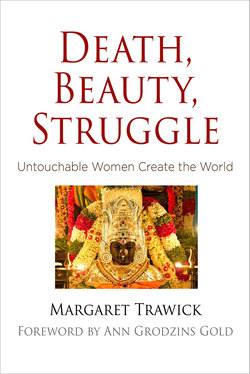Death, Beauty, Struggle

Реклама. ООО «ЛитРес», ИНН: 7719571260.
Оглавление
Margaret Trawick. Death, Beauty, Struggle
Отрывок из книги
Death, Beauty, Struggle
Kirin Narayan and Alma Gottlieb, Series Editors
.....
An obstruction to mobility, in addition to the other obstructions Dalit women face, lies in the obscurity, to outsiders, of present-day rural Dalit women’s verbal art. In some forms of oral literature, the obscurity may be intentional. But it is also a consequence of the details of locale, of the language and its use in some social situations, and of local dialect variations, which are not to be found in dictionaries—what is sometimes called “local knowledge.”19 Therefore, in order for one to know what is being said, one must know the place where the singer or writer lives, one must know the people who live there, one must know how they live, and one must know the language in which they speak, chant, or sing. Whereas there are universally knowable aspects of old and new Tamil literature, oral and written, when local realities are not understood, the flesh can fall away from the bones. This is true of popular English literature of the present age, which is meant to appeal to a wide audience, as it was true of literature, both oral and written, when few people could read or write, and rural people steeped in local knowledge could not be well understood except by others who spoke the same language/dialect. In the current millennium, cosmopolitan intellectuals may lose all knowledge that cannot be conveyed in a universalist medium. The modern Tamil Dalit poetry that I have seen so far is not in song form but in written free verse form and printed. The oppressors in the poems are often Brahmans, although in Tamil Nadu, the oppressors are not so much Brahmans as high-caste landlords who practice a form of Brahmanism involving notions of caste-based purity and pollution. In the Dalit journal Murasu an explicit aim is to universalize Dalit voices. The prominent young Dalit poet Meena Kandasamy writes mainly in English and has won national and international prizes for her poems. Some may say that she has moved too far from her Dalit “roots.” But who would want to go back there?
The unschooled are told that they cannot speak or write adequately. But the well-schooled, the powerful, the technicians, the managers, the professors, and some who wish to improve the lot of the very poor will not listen to and cannot hear what the unschooled have to say. Some of the privileged among those without privilege will learn the language of privilege. They are motivated to do so, after all. Few among the privileged will learn to speak, or think, like an old laboring woman from some village somewhere. Still less will they find the time to learn a “tribal” language. This is not just a matter of negligence and laziness, it is a matter of difficulty. The inability on the part of the highly schooled to learn the languages of the unschooled is a diminution of mental power for humanity. It is an intellectual loss for us all.
.....